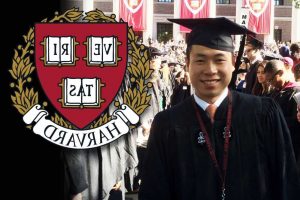Rags-to-riches Harvard grad shares the unspoken secrets of success

More On:
harvard university
Why won’t Biden target anti-Asian discrimination in the Ivy Leagues?
Harvard punishes professor over Jeffrey Epstein ties
Harvard professor ignites uproar over ‘comfort women’ claims
Majority of Americans disapprove of Biden’s immigration, LGBTQ executive orders: poll
When he was just 14 years old, Gorick Ng got a wake-up call about how the world really works.
Ng’s single mother was laid off from her job at a sewing machine factory, and in a household that was already so cash-strapped the tooth fairy never visited, money got even tighter.
As an only child, Ng shifted into survival mode, spending lunches, late nights and weekends creating a resume for his mother and scouring job boards.
“We were applying to hundreds of jobs and no one got back to us,” Ng told The Post. “It was demoralizing.”
To make ends meet, Ng and his mom began cleaning houses in Toronto, where they lived. He painted fences and mowed lawns.
Soon his mother was able to obtain a grant to return to school and secure a child-care job.
But the experience left an impression on Ng.
“My mother used to say that getting ahead is all about hard work,” Ng, 29, writes. “My mother was wrong … Hard work is only the price of admission to the game of career building.”
Getting jobs and getting ahead is about “the certain ways of doing things that managers expect but don’t explain and that top performers do but don’t realize.”
Ng, now a Harvard career adviser, has assembled these tips in his new book, “The Unspoken Rules: Secrets to Starting Your Career Off Right” (Harvard Business Review Press), out now.
The book is meant to remove the learning curve that many young professionals face and includes advice on how to dress, when to speak up in meetings and how to network.
But many of the rules grew out of Ng’s own awakening, starting with helping his mother job hunt.
“I may have been dealt a bad hand, but what can you do with that hand or outside this game?” he says.
He learned one of his “unspoken rules” when he began applying to colleges and a friend showed him that gaining entry into elite institutions went far beyond the simple application. There was a certain way essays needed to be written, and teachers’ hands needed to be held to write the right kind of recommendation that “paints a picture of how you’ve risen above your circumstances, gone above and beyond and become a leader within your own context,” he says.
“I quickly realized, wow, nowhere on the school’s Web site does it say any of these things,” he says. “If I were playing a video game, I feel like I just unlocked a secret level.”
Ng ultimately attended Harvard. There, he observed how the wealthy, connected student body navigated the world. And he also learned what not to do.
In college, Ng was introduced to a local politician who asked him, “Tell me about yourself.”
Ng gave a rambling biographical answer. The politician asked what he wanted to do after he graduated. Ng said he wasn’t sure.
The conversation ended with, “Uh, well, it’s nice meeting you.”
Looking back, Ng knows what he should have said.
“I should have talked specifically about how my goals intersect with his goals. I should have said that I was interested in the specific type of work that he does and that — hint, hint, nudge, nudge — I was looking to intern somewhere,” he says.
After school, Ng landed a job at Boston Consulting Group, where he says his observations about how people achieve success started “compounding upon themselves.”
Generally in corporate America, he says, “privilege compounds,” where going to an elite prep school often leads to an elite college which leads to an elite MBA which lands an elite job where the elites stay tight with other elites. But Ng also realized that job performance is not enough to win promotions.
By interviewing hundreds of CEOs, managers and young professionals and picking their brains about what they would have done differently when they first started out, he came up with another “unspoken rule”: Think like an owner.
In the working world that means thinking how you can help your employer achieve his or her goals. Always be proactive. Build allies within the workplace by meeting others and volunteering for projects.
Overall, Ng says he hopes his book helps “people to get further, faster in their careers … and know what someone else would have needed to spend a lifetime or several lifetimes learning.”
In short, “you are the captain of your own career. If you don’t make it happen, it won’t happen.”
Share this article:
Source: Read Full Article



